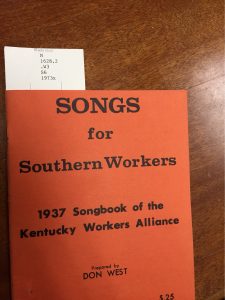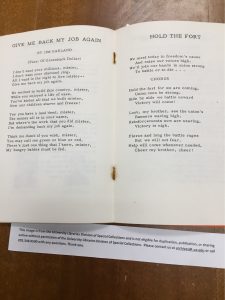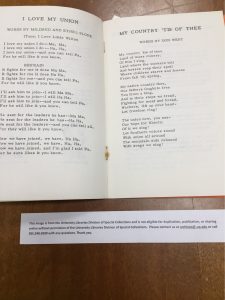
During the 1930’s workers rights were a hotly contested issue, because of the conflict between bosses and workers. The workers demanded more equality because their bosses controlled a large amount of the wealth while the workers were paid little. Men, women, and children had to work long hours with little pay in dangerous conditions for example: workers commonly lost fingers in the machinery they were working on. Strikes, protests and other actions were performed by many in hopes of wrestling rights away from the bosses. This was something of a new concept in the 1930’s. Due to the industrial boom labor conditions were extremely unhealthy, with few rights given to workers. Songs for Southern Workers: 1937 Songbook of the Kentucky Workers Alliance is a pamphlet filled with pieces to sing while protesting on the picket line. The pamphlet was initially published in 1937, but republished in 1973 because it was still relevant. The 1970’s were an era where human rights were starting to become an issue with court cases like Roe vs. Wade, and the pamphlet’s emphasis on individual rights was still a powerful message in that era. These songs were resonant for labor, as during the 1970’s anti-union groups like the Construction Users Anti-Inflation Roundtable were formed.
Labor Unions in the 1930’s
Even though labor unions have been legal in the United States since 1842, they did not have a large amount of rights until the passage of the Fair Labor Standards Act in 1935. Since the book by Don West was published originally in 1937, the purpose of the publication was to get the word out about how labor unions could advance the economic prosperity for each individual worker while also expressing the rights that labor unions gave all people.
The purpose of the Fair Labor Standards Act (FLSA) was to, “prevent excessive concentrations of wealth” because individuals like Carnegie and Rockefeller previously controlled a large amount of that wealth. It was because of this large concentration of wealth that Senator Wagner said, “the maldistribution of wealth was the cause of the Great Depression” because the employees could not earn a fair wage (Keyserling). Labor unions, prior to the FLSA, were supposed to advocate for higher workers’ wages, but they could not enforce this because, “fair competition did not recognize the right of labor to bargain collectively” often times firing employees for trying to collectively bargain (Keyserling). However, the FLSA made it illegal for businesses to interfere in the activities of labor unions; strengthening labor unions and increasing the rights of workers.
The rights of workers in labor unions expanded under the FLSA by, “fighting against the limitations to man’s fulfillment of himself” (Rosenfarb). The corporations, with their massive wealth, limited the worker’s fulfillment of a fair wage by not allowing collective bargaining and organizations of labor thus passing the FLSA was necessary to, “protect against the economic absolutism” (Rosenfarb). Workers were now able to speak freely about their labor conditions while not having to fear that their opinions would get them fired. For example, Songs for Southern Workers was published after the passage of the FLSA and many other labor unions, such as the CIO, were formed because of more support for unions. Other than speaking freely and receiving the right to organize, workers also would be able to negotiate for fairer wages for everyone in the company, not just the members of their own group.
Since they advocated for higher wages and conditions for everyone, not just members of the union, the unions were seen as a progressive and inclusive group. For example, unions were mostly open to people of all races and the FLSA did not discriminate against races saying, “the extent of collective bargaining, job discrimination on the basis of race will tend to be eliminated” (Rosenfarb). The unions included everyone in their negotiations which was revolutionary at the time because the Civil Rights movement had not yet started. Often times even people who were, “anti-union frequently were racially hostile” (Rosenfarb). These people were seen labeled as racist ultimately creating a small spark that led to the civil rights movement and the reprinting of the book.
Overview

For the most part the songs are angry about conditions and steadfast in not backing down. The authors are trying to communicate that issues of unfair pay and hazardous conditions are hurting workers very badly, and that they are not going to take it anymore. For instance in the piece “Give me back my job again” the singer is proclaiming that they are not demanding anything out of line (“I don’t want your millions, mister”), but the low pay and hazardous conditions they work under are intolerable and they demand compensation. Then, for other pieces, the tone is rather sad, and laments that America has found itself in this situation. “Gone are our jobs” is a perfect example of this with phrases like “we live in want and dread”, but ultimately the song ends with an expression of how they will not be broken, that they will take what is theirs. In the song “Not going to work and starve no more” the indignation over low pay is apparent even in the title. The pamphlet not only expresses a desire for change, but also a decree of solidarity with other workers, with songs like “Hold the fort” and “Solidarity forever”.
Parody as Social Commentary

Parody is a very strong way to deliver a message. It takes something that the opposition usually thinks very highly of, and twists it to have anew meaning. Since this is the case “Ridicule and parody have a long tradition in the labor movement” (Huck, 311). In Songs for Southern Workers, there is one song in particular that is loaded with parody. The song is ‘My Country ‘Tis of Thee’. The original version of this song usually proclaims proudly of being an American, but the parody in Songs for Southern Workers is a biting condemnation of how the bosses get all of the power and the workers get nothing. Lines like “Land where the workers toil and the bosses reap their spoil” all set to the tune of a recognizable patriotic song hammer home the point that men’s labor is given no reward (West, 5). Parody has been used by other unions too, “For more than fifteen years the Teamsters Campaign Department has utilized parody of corporate identity as a tool against employers” (Huck, 313). Though it’s less strident in our other pieces, parody is still at play. All of our songs are set to common household tunes. This means that the workers will easily know the tune to the songs, but also mocks these household songs with the grim reality that people are being treated like animals while others profit.
Politics in the 1970’s
The pamphlet was republished in the 1970’s; this begs the question: why would they be republished after this long a lapse in time? Firstly, the views expressed in the songs achieved a lot of traction in the years preceding publication. The songs express a loathing of the upper classes who put them in slave-like near starvation conditions under the cruel yoke of their enemies. These are not men who believe in a mutually beneficial exchange of labor for compensation under a capitalist system where everyone is left better off. They see the system itself as the problem. That anti-establishment view of the world grew popular in light of the Vietnam War. John Kerry, in Congressional testimony, boldly claimed that the war was kept going in order to serve the ego of America’s leaders (Kerry). President Nixon did not want to be the first United States President to lose a war (Kerry). Other anti-war campaigners whispered darkly about the military-industrial complex and how the war was not to liberate a defenseless people from Marxist tyranny but a cynical effort to prop up the defense industry. Class tensions would have increased as the well-connected got out of the draft and the poor went into the jungles of Southeast Asia. “A rich man’s war but a poor man’s fight,” is a cliché for a reason. The Vietnam War was a shock to the country for far more fundamental reasons. John Kerry’s testimony exposed a number of atrocities and war crimes perpetrated by United States forces (Kerry). This shocked a nation that was convinced of its own moral righteousness. They were the ones with gulags. They were the ones who subjugated Eastern Europe (Sitikoff). It was in this atmosphere that the union’s message became attractive. If our capitalist leaders had gone to war on false pretenses and we behaved this badly, who was to say we were better?
Bibliography:
Huck, Gary, and Konopacki Mike. “Art for Mobilization.” Scout. N.p., n.d. Web. 9 Mar. 2017
West, Don, comp. Songs for Southern Workers 1937 Songbook of the Kentucky Workers Alliance. Huntington, West Virginia: Appalachian Movement, 1973. Print.
Kerry, John Forbes. “Vietnam Veterans Against the War Statement by John Kerry to the Senate Committee of Foreign Relations.” Vietnam Veterans Against the War Statement by John Kerry. University of Virginia, 23 Apr. 1971. Web. 20 Mar. 2017. <http://www2.iath.virginia.edu/sixties/HTML_docs/Resources/Primary/Manifestos/VVAW_Kerry_Senate.html>.
Sitikoff, Harvard. “The Postwar Impact of Vietnam.” The Postwar Impact of Vietnam. University of Illinois, n.d. Web. 20 Mar. 2017. <http://www.english.illinois.edu/maps/vietnam/postwar.htm>.
Keyserling, Leon H., and Joseph Rosenfarb. The Wagner Act: After Ten Years. Thesis. University of California, 1945. Print.
Spencer Noell
Philip Foti
Aidan Raferty